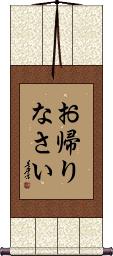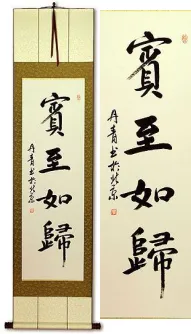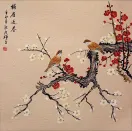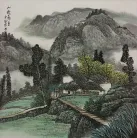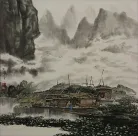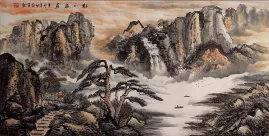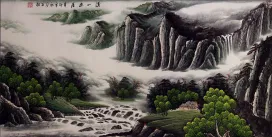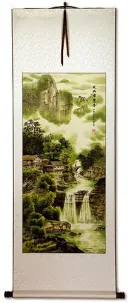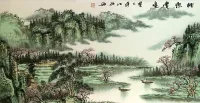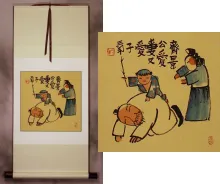Many custom options...
And formats...

The name Welcome Home in Chinese / Japanese...
Buy a Welcome Home calligraphy wall scroll here!
Personalize your custom “Welcome Home” project by clicking the button next to your favorite “Welcome Home” title below...
Make Guests Feel at Home
Home away from home
This Chinese phrase suggests that a good host will make guests feel like they are returning home or are as comfortable as they would be at their own homes.
賓至如歸 is also the Chinese equivalent of “a home away from home,” and is used by Chinese hotels, guest houses, and inns to suggest the level of their hospitality that will make you feel at home during your stay.
Welcome Home
お帰りなさい is a common Japanese way to say, “welcome home.”
This is said by a person greeting another as they return home. It's a typical phrase that is almost said by reflex as part of Japanese courtesy or etiquette.
Sometimes written as 御帰りなさい (just the first character is Kanji instead of Hiragana).
Note: Because this selection contains some special Japanese Hiragana characters, it should be written by a Japanese calligrapher.
This in-stock artwork might be what you are looking for, and ships right away...
Gallery Price: $100.00
Your Price: $49.77
Gallery Price: $500.00
Your Price: $178.88
Chinese Village Home Landscape Painting
Discounted Blemished
Gallery Price: $90.00
Your Price: $49.00
Chinese River Boat Home
Landscape Painting
Discounted Blemished
Gallery Price: $35.00
Your Price: $19.00
Gallery Price: $120.00
Your Price: $79.88
Gallery Price: $400.00
Your Price: $188.88
Gallery Price: $400.00
Your Price: $188.88
Gallery Price: $234.00
Your Price: $129.88
Gallery Price: $400.00
Your Price: $138.88
Gallery Price: $60.00
Your Price: $36.88
Gallery Price: $60.00
Your Price: $36.88
Gallery Price: $61.00
Your Price: $33.88
Gallery Price: $61.00
Your Price: $33.88
Gallery Price: $72.00
Your Price: $39.88
Gallery Price: $60.00
Your Price: $36.88
Not the results for welcome home that you were looking for?
Below are some entries from our dictionary that may match your welcome home search...
| Characters If shown, 2nd row is Simp. Chinese |
Pronunciation Romanization |
Simple Dictionary Definition |
お帰りなさい see styles |
okaerinasai おかえりなさい |
More info & calligraphy: Welcome Home |
請便 请便 see styles |
qǐng biàn qing3 bian4 ch`ing pien ching pien |
Please do as you wish!; You are welcome to do whatever you like!; Please make yourself at home. |
お帰り see styles |
okaeri おかえり |
(1) (honorific or respectful language) return; (interjection) (2) (abbreviation) welcome home |
御帰り see styles |
okaeri おかえり |
(1) (honorific or respectful language) return; (interjection) (2) (abbreviation) welcome home |
御帰りなさい see styles |
okaerinasai おかえりなさい |
(interjection) welcome home |
Variations: |
okaeri おかえり |
(1) (honorific or respectful language) return; (interjection) (2) (abbreviation) (See お帰りなさい) welcome home |
Variations: |
okaeri おかえり |
(1) (honorific or respectful language) return; (interjection) (2) (abbreviation) (See お帰りなさい) welcome home |
Variations: |
okaerinasai おかえりなさい |
(interjection) welcome home |
Variations: |
okaerinasai おかえりなさい |
(interjection) (stock phrase said when someone comes home) welcome home |
The following table may be helpful for those studying Chinese or Japanese...
| Title | Characters | Romaji (Romanized Japanese) | Various forms of Romanized Chinese | |
| Make Guests Feel at Home | 賓至如歸 宾至如归 | bīn zhì rú guī bin1 zhi4 ru2 gui1 bin zhi ru gui binzhirugui | pin chih ju kuei pinchihjukuei |
|
| Welcome Home | お帰りなさい | okaerinasai | ||
| In some entries above you will see that characters have different versions above and below a line. In these cases, the characters above the line are Traditional Chinese, while the ones below are Simplified Chinese. | ||||
Successful Chinese Character and Japanese Kanji calligraphy searches within the last few hours...

